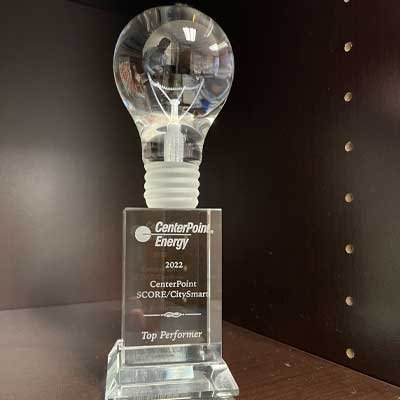Facilities, Planning, and Engineering win energy conservation award


In Celebration of Earth Day, April 22, UTHealth Houston is highlight the various ways the university’s community is investing in our planet.
The UTHealth Houston Office of Facilities, Planning, and Engineering was recognized as a leader in energy conservation by CenterPoint — bringing home an award for completing the largest custom project in 2022 and an incentive check for $186,275 for its smart use of energy-reducing technologies.
UTHealth Houston was among the 2022 CenterPoint SCORE and City Smart awardees for a project to update the air conditioning and heating systems inside the Reuel A. Stallones Building, which currently houses UTHealth Houston School of Public Health.
The building renovations will save the university more than 627 kilowatts of energy per year and more than 869,000 kilowatt-hours per year. The project will save the university more than $782,000 in utility costs over the next decade.
“Our facilities people are the best in the Texas Medical Center,” said Kevin Dillon, MBA, CPA, senior executive vice president and chief operating officer. “Maintaining research, educational, and clinical buildings is very costly. Having creative folks who are committed to finding innovative ways to reduce energy costs while advancing our mission areas is a tremendous resource to UTHealth Houston.”
The four-year, $25.5 million project at the School of Public Health was funded using tuition revenue bonds. Brady Smyth, senior construction manager, oversaw the project, but the kudos are shared among several teams. Ideas are freely shared in the department to aid in saving energy costs and maintaining the longevity of the university’s assets.
Key contributors include the teams of Julie Lucas, associate vice president of facilities planning, design, and construction; Steven Bennett, director of maintenance, operations, real estate, and contract services; and Bobby Watson, director of utilities, controls, and energy management. Other key contributors include Robin Murtishaw, senior construction inspector, and Gail White, Facilities, Planning, and Engineering maintenance supervisor.
The Reuel A. Stallones Building is now equipped with sensors that can detect when a room is occupied. These types of sensors are often seen for lights, but also have been applied to airflow. If a room is unoccupied, the system can adjust airflow accordingly.
This technology was also applied to conference rooms and auditoriums. In these rooms, “people counters” were installed at the entrance of the rooms. Algorithms will then heat or cool a room based on the number of people in the room, adjusting the air flow to make the room comfortable.
Major innovations for the Reuel A. Stallones Building include adding demand control ventilation systems to its air handlers. These systems can read the temperature and humidity in the atmosphere and are programmed to bring in more outside air when the weather is nice. The system is akin to opening windows at home in the spring and saves on cooling costs . Design and installation was a team effort because the air handling units had to be positioned and programmed in a specific way for the machines to be able to properly pull in more air when needed.
Various systems in the building also were equipped with new variable speed drives, which allow units to ramp up and ramp down in instances where air conditioner motors and various pumps are programmed to either be off or on — like a pool pump. Having the ability for a motor to maintain a constant volume instead is a major energy-saver.
“I’m incredibly proud of the teamwork and innovation that made this award a reality,” said William “Wes” Stewart, vice president of Facilities, Planning, and Engineering. “Oftentimes, the projects submitted for these awards are centered on upgrading lighting. This project was innovative in that it focused on new ways to use technology to drive heating and cooling costs down.”
This is the second SCORE Award for the university. UTHealth Houston was recognized in 2018, taking top honors for the most kilowatt reduction for a non-school district organization.
Energy Conservation Plan saves millions
The $186,275 incentive award given to the university as part of this honor is the latest in a longtime project, started in 2017, to increase energy efficiency and reduce utility bills paid by the university by updating utilities on campus and ensuring new construction includes energy-efficient systems.
Recent funds came through the university’s participation in CenterPoint’s SCORE program, a federally mandated program that provides rebates to schools, nonprofits, and higher education institutions for increasing energy efficiency on campus. Other programs include ERCOT’s Demand Response Program which provides incentives for having qualified (clean-burning) emergency generators on standby in the event of a power outage or shortage.
Participation in these programs have saved the university more than $500,000 in one-time incentives, and saved more than $4 million annually on energy costs.
Prior to 2017, the campus consumed about $16 million in utilities every year. It is now consuming about $12.5 million annually, despite the university adding new facilities and space.